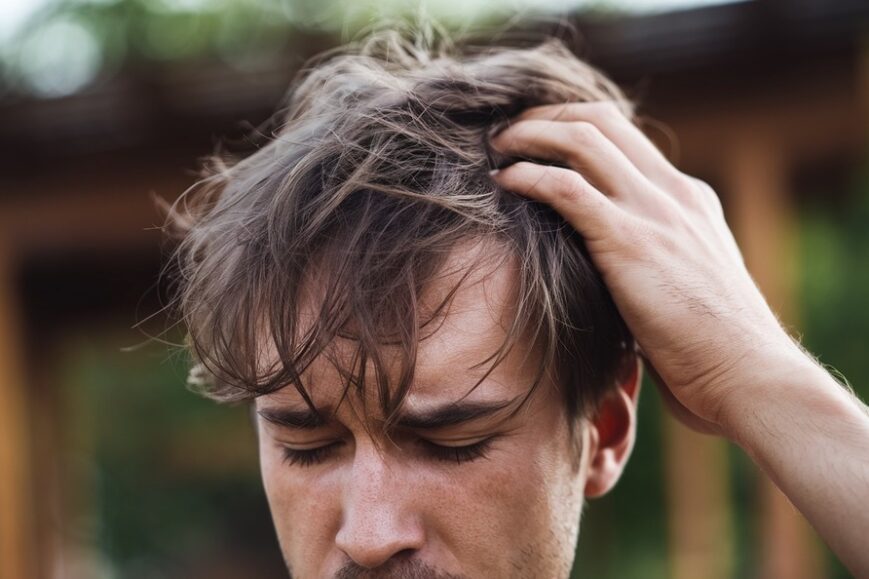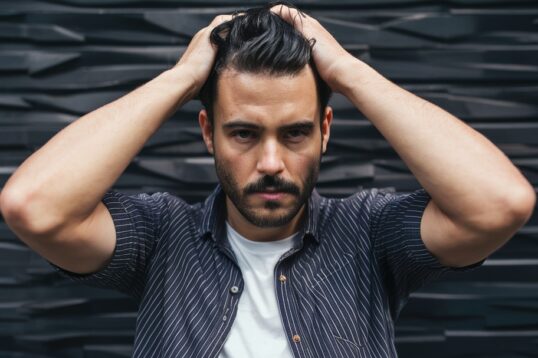You may ask yourself, ‘Why does my scalp itch, and is it causing me to lose hair?’
You’re not alone. Itching of the Scalp and Hair Loss are related conditions that can bother many people. While scratching may bring some comfort in the short run, it could worsen things. Let’s dig in.
Most people experience skin issues such as itching of the scalp and hair loss at some point.
Itchy scalp and hair loss are closely related, even though itching isn’t a direct cause of hair shedding. Persistent itchiness often results from dandruff, eczema, or psoriasis, which can cause inflammation and irritation. This irritation may lead to scratching, which damages hair follicles and weakens them, potentially causing hair to fall out.
Additionally, fungal infections, dry scalp, and sensitivity to hair products can exacerbate itchiness and hair loss. To manage these issues, use gentle, hydrating hair products, maintain good scalp hygiene, and avoid excessive scratching while addressing any underlying conditions with a dermatologist.
When Itching of the Scalp Occurs with Hair Loss
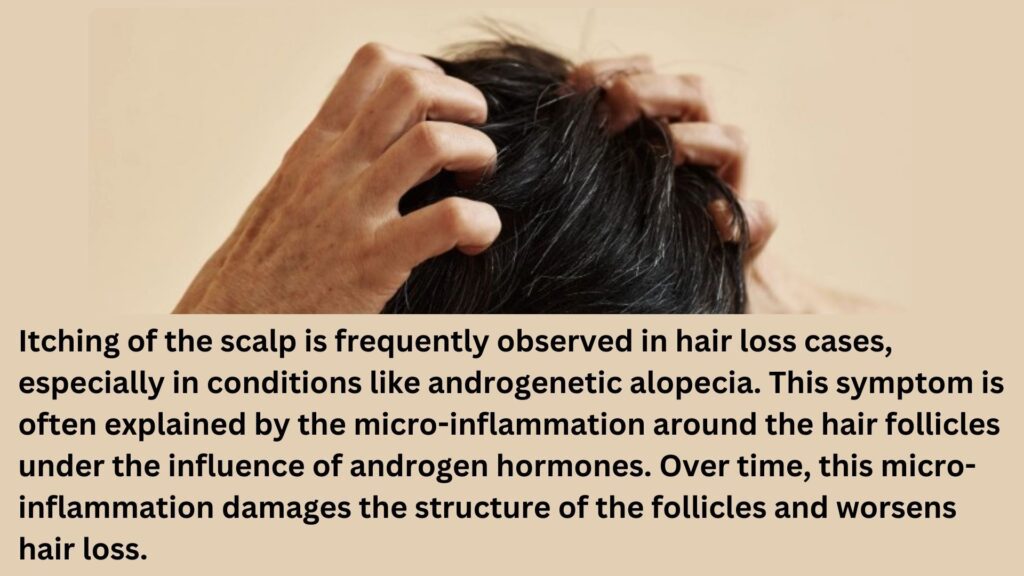
What Causes Itching of the Scalp and Hair Loss?
- Dandruff: Dandruff is one of the most frequent culprits. A yeast-like fungus irritating the skin causes dandruff, leading to an itchy scalp. If left untreated, thick layers of dandruff can disrupt the hair growth revolution, potentially causing hair loss.
- Fungal Infections: Conditions like scalp ringworm can cause intense itching and hair loss. These infections weaken the hair follicles, making them more susceptible to damage.
- Allergic Reactions: Some people may experience itching due to allergic reactions to hair products, such as dyes or shampoos. Ingredients like paraphenylenediamine (PPD) can cause inflammation and lead to hair loss if the irritation persists.
- Psoriasis: This autoimmune condition can lead to severe itching and flaking on the scalp. The inflammation caused by psoriasis can damage hair follicles, resulting in hair loss.
- Folliculitis: This is a condition of the hair follicles that can cause itchy bumps on the scalp. If left untreated, it can lead to momentary hair loss.
- Lichen Planopilaris: This inflammatory condition can cause itchy, scaly patches and hair loss. It often requires medical intervention to be managed effectively.
- Alopecia Areata: This autoimmune disorder can cause patchy hair loss and may lead to an itchy scalp as the immune system attacks hair follicles.
Drink plenty of water to keep your scalp and hair hydrated from the inside out, helping to prevent dryness and itching.
Lifestyle Factors Affecting Itching of the Scalp and Hair Loss
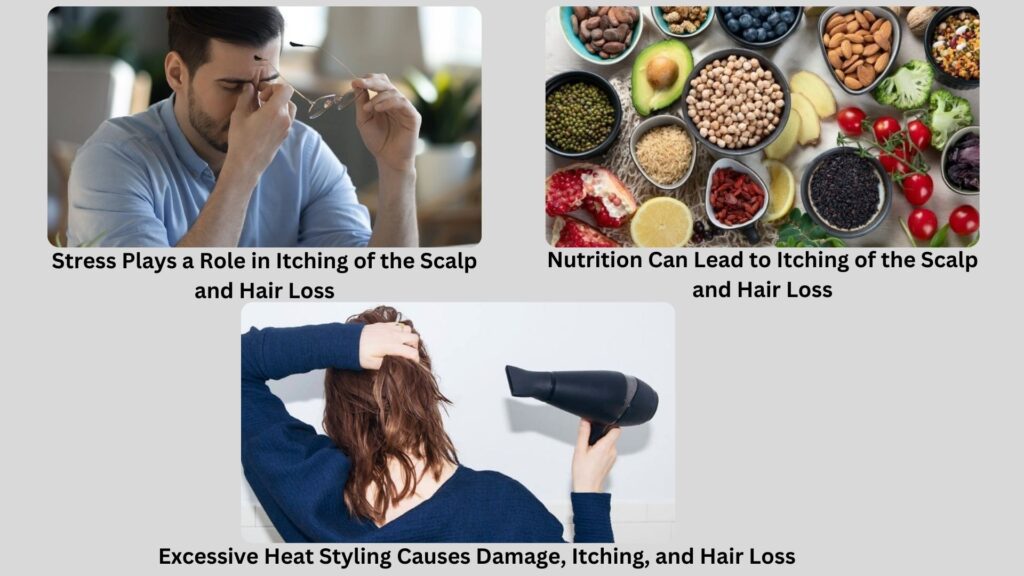
How Stress Plays a Role in Itching of the Scalp and Hair Loss
- Stress isn’t just in your head but also on your scalp. When under constant pressure, your body reacts by producing hormones that can trigger inflammation, leading to an itchy scalp.
- Chronic stress can disrupt the hair growth, leading to shedding and thinning. So, if you’re feeling tension, it might be the reason behind your scalp itch and hair loss.
Poor Nutrition Can Lead to Itching of the Scalp and Hair Loss
Your scalp, like the rest of your body, needs proper nutrition. A lack of essential nutrients like zinc, iron, and biotin can lead to an itchy scalp and contribute to hair thinning.
Here’s what you can do to boost your scalp health through diet:
- To reduce inflammation, eat foods rich in omega-3 fatty acids (like salmon or flaxseed).
- Add biotin-rich foods like eggs and nuts to strengthen your hair.
- Don’t skip out on leafy greens for iron, which promotes healthy circulation to your scalp.
Excessive Heat Styling Causes Damage, Itching, and Hair Loss
Love your hair straighteners and blow dryers? Unfortunately, they might be doing more harm than good. Excessive heat can strip your scalp of natural oils, leaving it dry and itchy. Worse, it can damage your hair follicles over time, leading to breakage and hair loss.
Here’s how to prevent heat damage:
- Limitation heat styling to a couple of times a week.
- Always use a heat protectant before styling.
- Opt for lower heat settings to avoid frying your hair and scalp.
Reducing stress, eating a scalp-friendly diet, and being savvy with your styling tools can simultaneously tackle your scalp’s itching and hair loss.
A diet rich in vitamins like biotin, vitamin D, and omega-3s can promote scalp health and strengthen hair.
Managing Itchy Scalp and Hair Loss
Here’s a combined table for Medical Treatments and Natural Remedies to manage itching of the scalp and hair loss:
| Type | Treatment | How It Helps | How to Use |
|---|---|---|---|
| Medical Treatments | Medicated Shampoos | Reduces dandruff, fights fungal infections, soothes irritation | Use 2-3 times a week, massage into scalp |
| Corticosteroid Creams | Calms scalp inflammation and reduces redness | Apply a small amount to affected areas as directed | |
| Anti-fungal Treatments | Targets fungal infections causing scalp itching and hair loss | Use as prescribed by your doctor | |
| Natural Remedies | Coconut Oil | Deeply hydrates the scalp, reduces dryness and itchiness | Apply to scalp, leave for 30 minutes, rinse with shampoo |
| Tea Tree Oil | Anti-fungal, anti-inflammatory, fights infections | Mix with a carrier oil, massage into the scalp | |
| Aloe Vera | Soothes irritated skin, provides moisture to reduce itching | Apply directly to the scalp, leave on for 15-20 minutes |
This table highlights medical and natural options for effectively managing scalp itching and hair loss.
If dandruff is causing the itch, use an anti-dandruff shampoo containing zinc or selenium to control flakes.
Itching of the scalp and hair loss: these measures for prevention and care of the scalp.
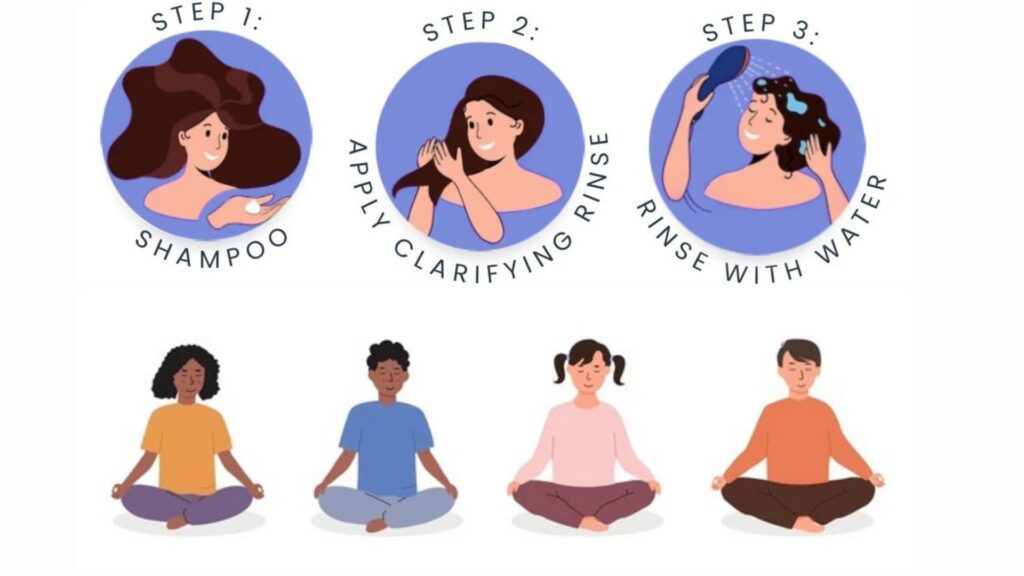
Maintain Good Scalp Hygiene
One of the simplest ways to avoid itching and hair loss is to maintain a regular cleansing routine for your scalp. Here’s how to keep your scalp healthy:
- Shampoo regularly but not too often: If you rinse your scalp too often, the oils your body produces are washed away, leaving the scalp dry and itchy.
Use gentle, sulfate-free shampoo. These will not leave your scalp itchy or worsen your hair’s dryness. - Rinse thoroughly: Always be diligent in rinsing out all the product residues, as they can accumulate on the skin’s surface and cause irritation. I want you to know that your attention to this detail will contribute to the health of your scalp.
Minimise stress as a way of maintaining the health of the scalp.
It is essential to realise that hair and the scalp are not immune to stress. Stress is known to enhance the body’s inflammation rate, leading to itching and sometimes hair loss. Here are some tips for lowering stress and safeguarding your scalp:
- Practice mindfulness or meditation: A few minutes daily can help improve your mental state and reduce stress.
- Exercise regularly: It also enhances scalp circulation to foster hair growth.
- Prioritise sleep: Rest becomes essential as it affords the body, including the scalp and hair follicles, time to regenerate.
If you follow these steps, you can be confident that your scalp will be healthy and avoid itching scalps or any further hair loss. This advice is designed to give you hope and optimism for the future of your scalp health.
Stress can trigger scalp issues and hair loss. Practice relaxation techniques like meditation or yoga to keep stress in check.
When to Consult a Healthcare Provider for Itching of the Scalp and Hair Loss
If you observe these symptoms, don’t be afraid to contact a specialist. They will help you determine the source of the issue and suggest workable solutions to stop future scalp irritation and hair loss.
If the itching persists, visit a dermatologist to rule out underlying conditions like psoriasis or eczema, which can lead to hair loss.
Conclusion
Dealing with Itching of the Scalp and Hair Loss can be frustrating, but it’s not something you have to live with forever. By understanding the causes, taking proactive steps with medical treatments or natural remedies, and focusing on scalp care, you can prevent further hair loss and soothe the itch.
Remember, if your scalp issues persist despite trying home remedies or if you notice significant hair loss, don’t hesitate to consult a healthcare provider. Early action can save you from long-term damage and help you regain control over your scalp health.
Stay consistent with your routine, keep your scalp healthy, and soon enough, both the Itching of the Scalp and Hair Loss will be under control.
FAQs
Can an itchy scalp cause hair loss?
Indeed, if you scratch a lot, your itchy scalp may be a factor in your hair loss. Over time, scratching may result in hair shedding, harming hair follicles.
What are the most common causes of itching of the scalp and hair loss?
Common causes include dandruff, dry scalp, fungal infections, scalp psoriasis, and allergic reactions to hair products. Stress and poor nutrition can also contribute.
How can I treat itching of the scalp and hair loss naturally?
Use natural therapies such as aloe vera to relieve inflammation, tea tree oil to battle infections, and coconut oil to moisturise the scalp. It’s also crucial to minimise stress and keep your scalp clean.
Can hair grow back after hair loss caused by an itchy scalp?
Yes, hair can grow back in most cases if the underlying cause of scalp itchiness and damage is treated early. However, prolonged scratching and follicle damage may permanently thin hair if left untreated.
What shampoos are best for itching of the scalp and hair loss?
Look for medicated shampoos with ingredients like ketoconazole, selenium sulphide, or zinc pyrithione. These can help with dandruff and fungal infections, reducing itchiness and hair loss.
How does stress affect scalp health and hair loss?
Stress triggers inflammation, leading to an itchy scalp and disrupting the hair growth cycle, which can cause hair loss. Reducing stress through mindfulness, exercise, and proper sleep can improve scalp health.
Are there any treatments for Itching of the Scalp and Hair Loss?
Treatment choices vary based on the underlying cause and may include:
Medicated Shampoos: For dandruff or psoriasis.
Topical Steroids: To reduce inflammation.
Antifungal Treatments: For fungal infections.
Oral Medications: Such as finasteride for genetic hair loss.
